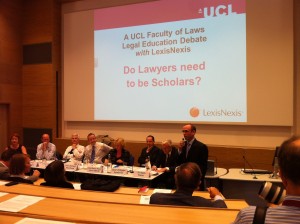First a little background: the Legal Education and Training Review is a joint project between the Bar Standards Board (BSB), the Solicitors Regulation Authority (SRA) and the Institute of Legal Executives Professional Standards (IPS). As its name suggests, the findings of the research generated by this review will have far-reaching implications on the nature of future legal education and training. The research team are essentially looking at whether the spectrum of legal education and training in the UK is fit for purpose. It has been widely reported to be the most wide-ranging review of legal education since the Ormrod Report in 1971. Final recommendations will be published in December 2012. Research for the Review is being led by Professor Julian Webb of Warwick University.

UCL hosted a LexisNexis-sponsored debate on 11th October 2011 ‘Do Lawyers Need to be Scholars?’ with a view to kick-starting discussion around the Review. Chaired by Professor Dame Hazel Genn DBE QC, Dean of UCL Faculty of Laws, the panel was more weighted on the academic side, though their views were far from uniform. It included:
David Bickerton (Managing Partner, Clifford Chance)
Rebecca Huxley-Binns (NTU and winner of Law Teacher of the Year 2010)
Professor Stephen Mayson (Director of Legal Services Policy Institute, College of Law)
Professor Richard Moorhead (Cardiff Law School)
Professor Philippe Sands QC (UCL Faculty of Laws/ Matrix Chambers)
Each panel member got 5 minutes to state their position before some debate amongst themselves and then a final passing over to the audience. Sir Mark Potter who chairs the LETR Panel also said a few words around the review, although he was treading carefully so as to convince us no preconceptions were driving the review.
Key areas of discussion centred around the standard of the undergraduate law degree, with Phillippe Sands kicking off with a controversial stance, declaring his one regret in life was studying law and not doing something else first, before going to study law as a graduate. His assertion centring around the belief that studying law as an undergraduate in this country is stifling, closing your mind down to thinking in a particular way, at the very point when it should be opening up in new ways.
Rebecca Huxley-Binns recommended abolishing the seven core subjects in favour of a more value-driven curriculum, and asserted that the providers of the LPC/BPTC shouldn’t dictate the content of the undergraduate degree.
David Bickerton stated he was happy with the quality of graduates available to his firm; declaring the study of law as interesting as history or mathematics. He was clear on the point that his firm was about employing the best people, but highlighted the lack of consistency between the LLB and GDL as a problem. On the question posed by the debate, he stated that firms had a lot to learn from those not driven by clients.
Richard Moorhead used his five minutes to talk around the idea that the study of law should be more inter-disciplinary and well-rounded. On asking his students why they chose to pursue a career in law, he received a range of responses ‘Money, doing interesting work, doing good, doing justice.’ He also touched on the creativity issue and suggested that far more interesting critical legal thinking was being produced in the US.
Stephen Mayson found many areas lacking; with not enough of today’s practising lawyers having enough skill in sometimes basic areas. Areas highlighted included: Ability to apply knowledge in a contextual meaningful way for clients, Project management to scope price and deliver, and maintaining an ethical regulatory framework of legal practice. He called on a need to research, develop writing and reasoning, as well as more of a focus on ethics and economism.

Once the audience got involved there was a great deal of standing up for the importance of the law degree. John Flood from University of Westminster told the panel the legal profession should ‘stay out of legal education’, and Stephen Mayson also bemoaning the profession’s level of influence. Baroness Deech from the Bar Standards Board also agreed on some level, saying its value was clear from the sheer numbers of students coming to study from abroad and then going back home to practice law. She believed its value was as a good all-round education, stating the bigger dilemma was what to do with all the law graduates.
The issue of what is studied was a dominant theme, with many panel members believing a study of law should encompass many other subjects too, Richard Moorhouse suggesting economics and psychology amongst others, in order to put the law into the context of a wider world view. Huxley-Binns went on to list some of the areas she believed should be in the brave new law degree: case law, application and cases, legislation, legal theory, critical legal reasoning (raising laughs with her aside of “not just blagging”), legal writing, ethics, legal commerciality/business awareness and problem solving.
So the general answer to the question posed? Yes lawyers do sometimes need to be scholars, and yes they certainly need the input of scholars (analysis of judgments, writing practitioner texts). In the audience The Rt Hon. Lord Justice Rix spoke up to say that “Teachers and professors need to be. Advocates and judges also need to be scholars”. He reflected on lawyers in city law firms who come to spend some time in the Court of Appeal: “Their eyes are opened – after years of doing transactions”. On the study of law he stated that we should aim to teach legal thinking and ethics, asking questions to which there are no satisfactory answers alongside legal history.
Read other posts about this event from Legal Aware website and the Legal Futures blog.
